Buying expired domains in South Africa involves several tax implications that buyers must navigate, including capital gains tax, value-added tax, and income tax reporting requirements. The South African Revenue Service (SARS) classifies these domains as assets, making it essential for purchasers to understand their tax obligations to ensure compliance and effective financial planning.
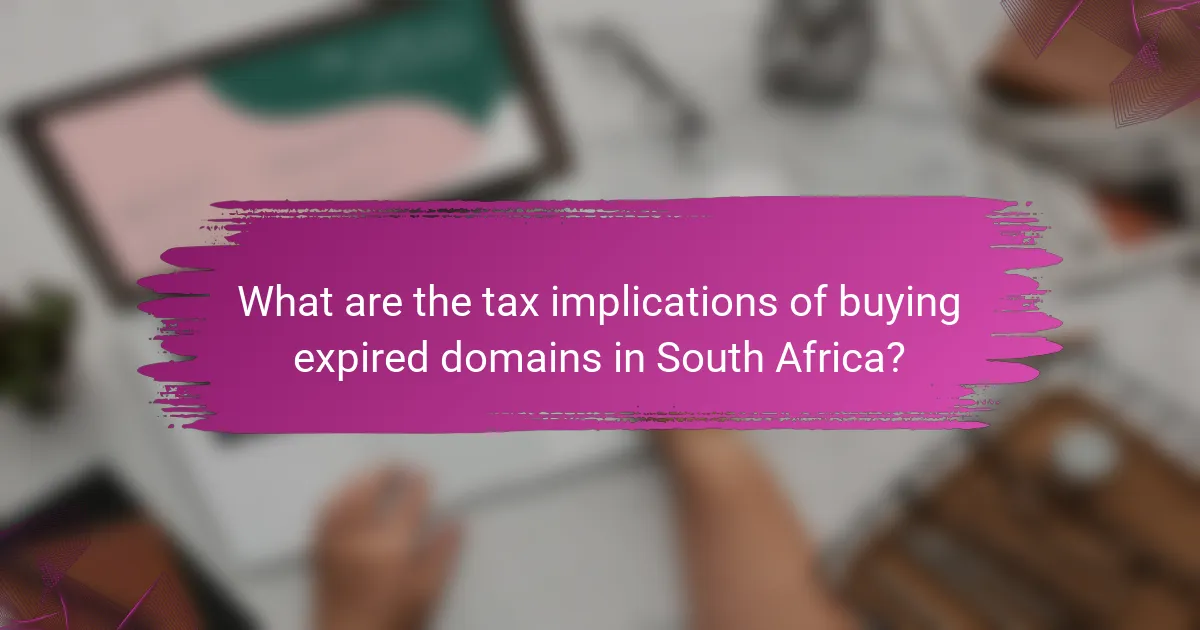
What are the tax implications of buying expired domains in South Africa?
Buying expired domains in South Africa can have various tax implications, including capital gains tax, value-added tax, and income tax reporting requirements. Understanding these aspects is crucial for compliance and financial planning.
Capital gains tax considerations
When you purchase an expired domain and later sell it for a profit, you may be subject to capital gains tax (CGT) in South Africa. This tax applies to the profit made from the sale, calculated as the difference between the selling price and the purchase price.
For individuals, the first R40,000 of capital gains is exempt from tax each year. If your total gains exceed this threshold, the remaining amount is added to your taxable income and taxed at your marginal rate. Keeping detailed records of your purchase and sale transactions is essential for accurate reporting.
Value-added tax applicability
In South Africa, value-added tax (VAT) may apply to the purchase of expired domains if you are registered for VAT. If you buy a domain as part of a business operation, you can typically claim input VAT on the purchase price.
However, if you are not registered for VAT, you will not be able to claim this back. It’s important to assess your business structure and registration status before making a purchase to understand your VAT obligations.
Income tax reporting requirements
If you generate income from an expired domain, such as through advertising or resale, you must report this income on your annual tax return. All earnings from the domain are considered taxable income and should be included in your total income for the year.
Keep thorough records of all income and expenses related to the domain, as this will help in accurately reporting your earnings and claiming any allowable deductions. Consulting a tax professional can provide additional guidance tailored to your specific situation.
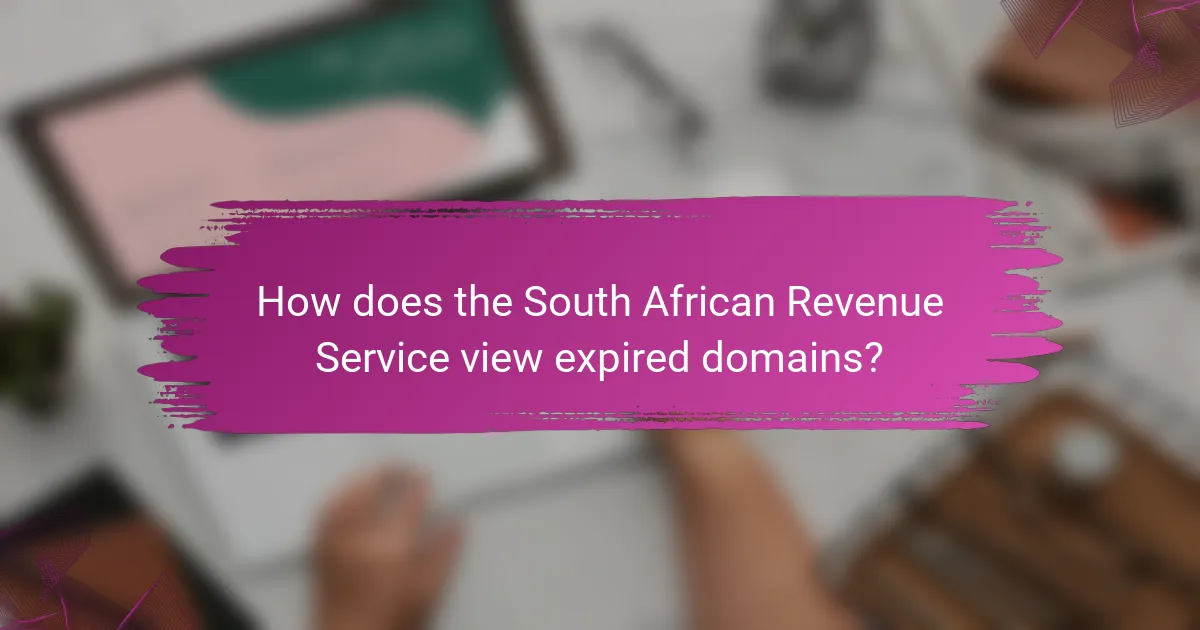
How does the South African Revenue Service view expired domains?
The South African Revenue Service (SARS) considers expired domains as assets that can have tax implications when bought or sold. Understanding how these domains are classified and taxed is crucial for compliance and financial planning.
Classification of expired domains as assets
Expired domains are classified as intangible assets under South African tax law. This means they can be included in your asset register and may affect your overall asset valuation. When purchasing an expired domain, it’s important to assess its potential value and how it fits into your business strategy.
For tax purposes, the acquisition cost of an expired domain can be capitalized, which may provide tax benefits when sold later. Keep records of the purchase price and any associated costs, as these will be necessary for calculating capital gains tax upon sale.
Tax treatment of domain sales
When you sell an expired domain in South Africa, the profit is subject to capital gains tax (CGT). The gain is calculated as the difference between the selling price and the acquisition cost, adjusted for any allowable expenses. It’s essential to report this gain in your annual tax return.
Depending on your total taxable income, the effective CGT rate can vary. Generally, individuals may be taxed at a lower rate compared to companies. Consider consulting with a tax professional to ensure compliance and optimize your tax position when dealing with expired domains.
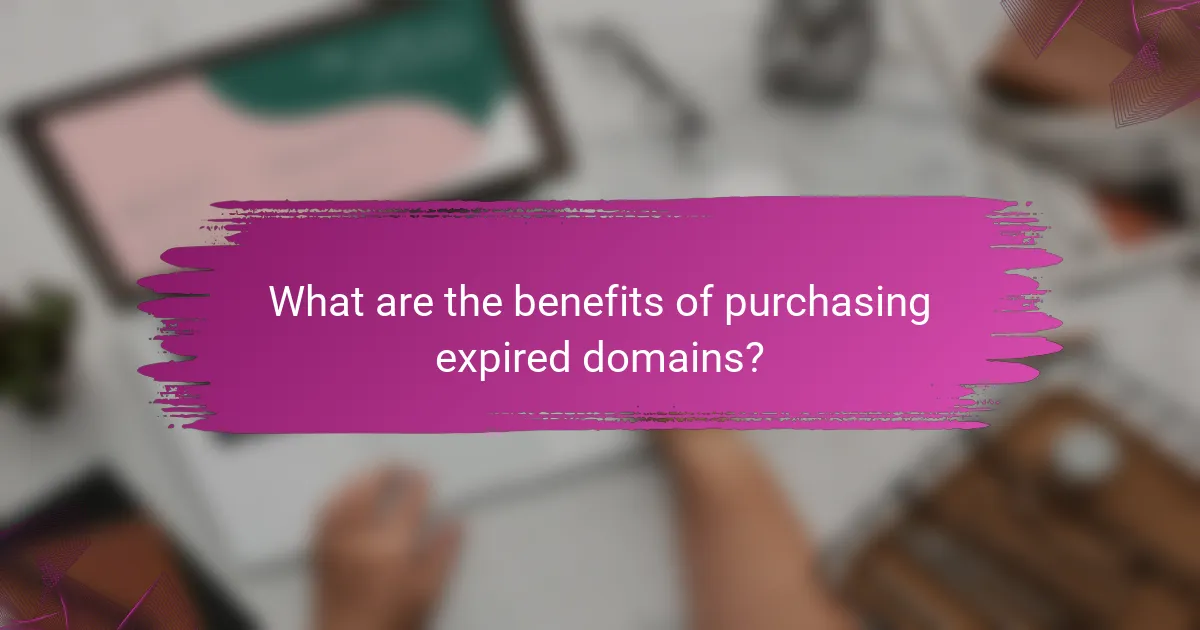
What are the benefits of purchasing expired domains?
Purchasing expired domains can offer several advantages, including enhanced search engine optimization (SEO) potential and established backlink profiles. These benefits can lead to improved website visibility and traffic, making them a valuable asset for online businesses.
Improved SEO potential
Expired domains often come with existing authority and trust from search engines, which can significantly boost your SEO efforts. When you acquire such a domain, you may experience quicker rankings in search results compared to starting from scratch.
To maximize SEO benefits, ensure the expired domain has a clean history, free from penalties or spammy associations. Tools like Ahrefs or Moz can help assess the domain’s past performance and authority metrics.
Established backlink profiles
One of the key advantages of expired domains is their established backlink profiles. These domains may have accumulated quality backlinks over time, which can enhance your site’s credibility and search engine ranking.
When selecting an expired domain, analyze its backlink profile to ensure it contains links from reputable sources. This can provide a solid foundation for your new website, potentially saving you time and effort in building backlinks from scratch.
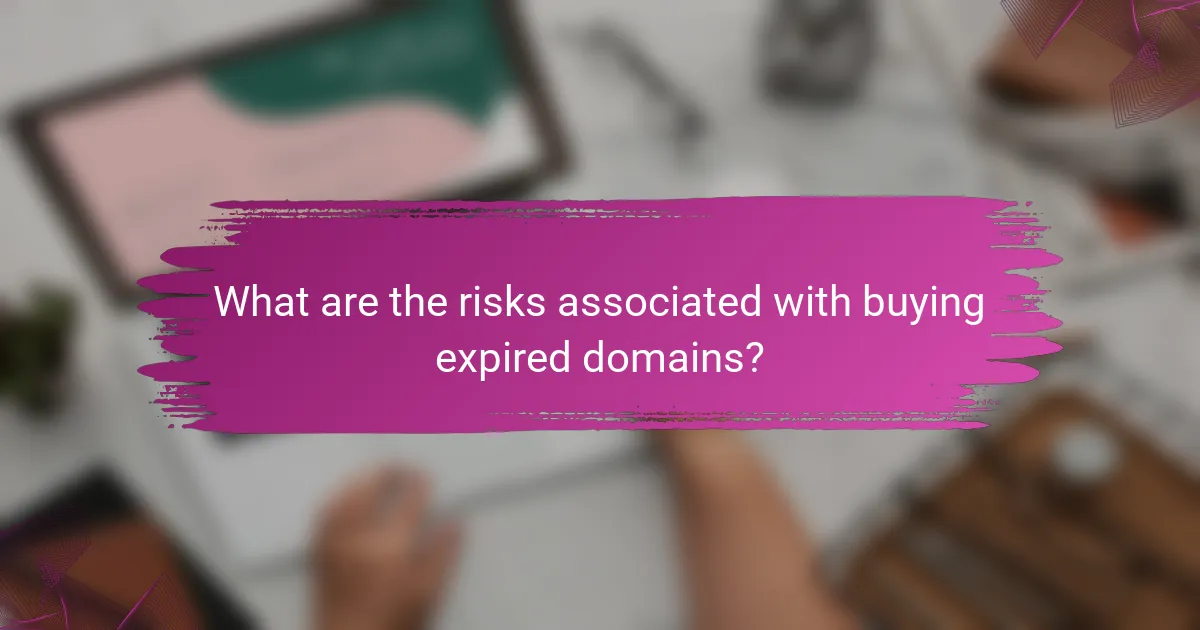
What are the risks associated with buying expired domains?
Buying expired domains carries several risks, including potential hidden liabilities and the impact of the domain’s history on its value. Understanding these risks is crucial to making informed decisions and avoiding costly mistakes.
Potential for hidden liabilities
Expired domains may come with unforeseen liabilities, such as outstanding debts or legal issues linked to previous ownership. These can include unpaid taxes, penalties, or even trademark disputes that could affect your use of the domain.
Before purchasing an expired domain, conduct thorough due diligence. Check for any existing legal claims or financial obligations by using domain history tools and public records. This proactive approach can save you from inheriting unwanted responsibilities.
Domain history affecting value
The history of an expired domain can significantly influence its market value. Domains previously associated with spam or illicit activities may carry a negative reputation, impacting their SEO potential and resale value.
To assess a domain’s history, utilize tools that provide insights into past ownership, traffic patterns, and any penalties from search engines. A domain with a clean history is generally more valuable and less risky than one with a questionable past.
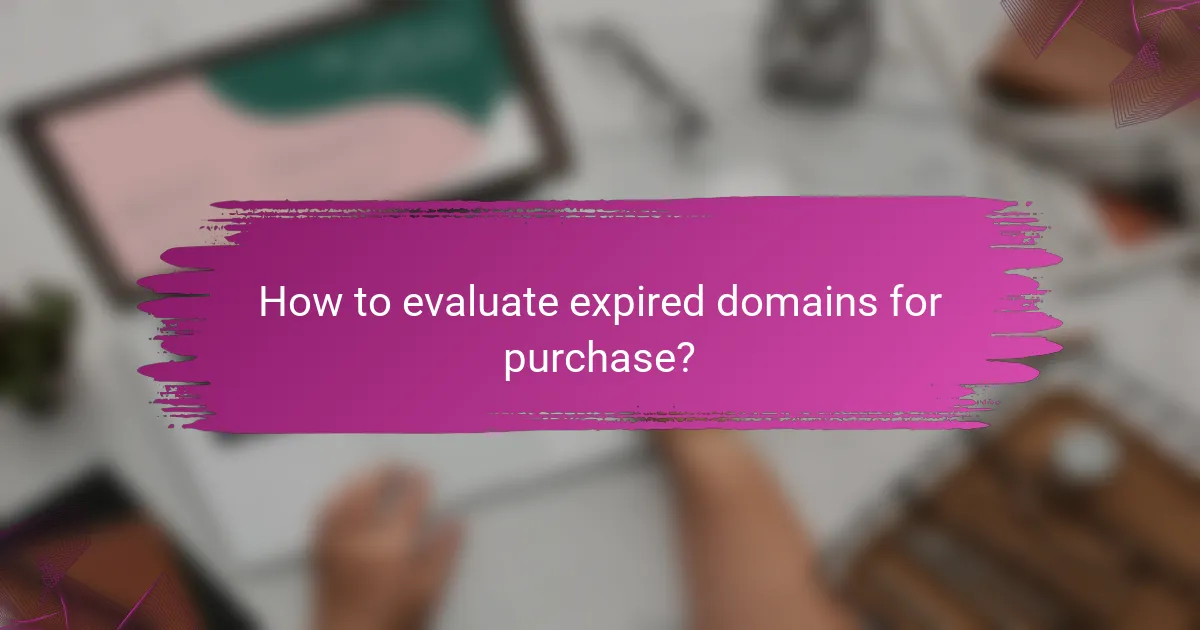
How to evaluate expired domains for purchase?
To evaluate expired domains for purchase, focus on their potential value based on authority, history, and relevance to your goals. Key factors include the domain’s past performance, link profile, and any existing traffic or SEO benefits.
Assessing domain authority
Domain authority is a metric that predicts how well a domain will rank on search engines. It is typically measured on a scale from 1 to 100, with higher scores indicating stronger potential. Tools like Moz or Ahrefs can help you assess this metric.
When evaluating domain authority, consider the quality and quantity of backlinks. A domain with a strong backlink profile from reputable sites will generally have higher authority. Aim for domains with scores in the mid to high range for better chances of ranking well.
Checking domain history
Understanding a domain’s history is crucial before making a purchase. Check if the domain has been previously used for legitimate purposes or if it has a history of spammy activities. Tools like Wayback Machine can show you past versions of the site.
Additionally, look for any penalties or bans associated with the domain. A domain with a clean history is more likely to provide value, while one with a troubled past could harm your SEO efforts. Always verify the domain’s registration status and any previous ownership changes to ensure a smooth transition.

What are the best practices for domain acquisition in South Africa?
Best practices for domain acquisition in South Africa include thorough research on the domain’s history, understanding potential tax implications, and consulting with professionals. These steps ensure a more informed purchase and can help avoid unexpected costs or legal issues.
Consulting with tax professionals
Engaging with tax professionals is crucial when acquiring expired domains in South Africa. They can provide insights into how the purchase may affect your tax obligations, including VAT considerations and potential capital gains tax. This guidance helps you navigate the complexities of tax regulations associated with domain ownership.
When selecting a tax advisor, look for someone with experience in digital assets and e-commerce. They can help you structure your purchase to optimize tax efficiency and ensure compliance with local laws.
Utilizing domain appraisal services
Domain appraisal services can help you determine the fair market value of an expired domain. These services analyze various factors, including keyword relevance, traffic statistics, and historical sales data, to provide a reliable valuation. Knowing the domain’s worth can guide your negotiation strategy and budget allocation.
Consider using multiple appraisal services to get a range of values, as this can help you make a more informed decision. Be wary of overpaying for domains that may not deliver the expected return on investment, especially in a competitive market like South Africa.
